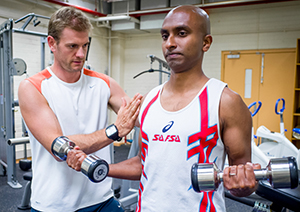 Exercise physiologists at Charles Sturt University (CSU) are using new digital technology to improve patients’ rehabilitation outcomes.
Exercise physiologists at Charles Sturt University (CSU) are using new digital technology to improve patients’ rehabilitation outcomes.
The CSU School of Exercise Science, Sport and Health has partnered with Physitrack, a digital exercise prescription tool, to use the technology for teaching, research and clinical practice.
Academics Dr Jayden Hunter (pictured) and Professor Frank Marino, who are both practicing accredited exercise physiologists at CSU’s Exercise Physiology and Functional Rehabilitation Clinic, have been using Physitrack in their clinical practice to improve patient exercise adherence and to remotely monitor each patient’s progression through their exercise rehabilitation program.
Dr Hunter said Physitrack and other similar digital exercise prescription tools are becoming increasing popular in clinical settings, particularly in eHealth circles.
“Patients at our clinic include people with a range of chronic health conditions including arthritis, cardiovascular disease, cancer, and Type 2 diabetes, to name a few,” he said.
“Physitrack is being used to provide patients with personalised video-based exercise prescription via an app that also enables them to communicate with practitioners remotely via messaging and video calling should they need advice and guidance between consultations.”
Dr Hunter plans to investigate the effectiveness of these tools to improve exercise adherence and health outcomes in patients for whom exercise is indicated as a form of treatment. He is particularly interested in the use of the technology for people living in remote or rural areas who don’t have easy access to health and rehabilitation services.
“Digital exercise prescription tools such as Physitrack may enable people suffering chronic health conditions to more easily access safe and effective exercise rehabilitation programs that are individually prescribed,” Dr Hunter said.
“Having the support of a digital platform with detailed exercise guidance videos and instructions, combined with practitioner communication features, may improve exercise program adherence and health outcomes.”
 In other research, Dr Hunter is leading a team of CSU researchers in a project partnership with NSW Ambulance to investigate the effects of different types of exercise training on a range of cardio-metabolic and musculoskeletal health outcomes in regional and rural paramedics.
In other research, Dr Hunter is leading a team of CSU researchers in a project partnership with NSW Ambulance to investigate the effects of different types of exercise training on a range of cardio-metabolic and musculoskeletal health outcomes in regional and rural paramedics.
“Regional and rural paramedics are among the most frequently injured healthcare workers in the country, and the project is in its early stages,” Dr Hunter said.
“But with the ability to remotely prescribe and monitor exercise training programs, we believe Physitrack may be an effective tool to use for the 150 paramedics involved in the project for whom supervised exercise at the workplace is not a feasible option. The digital platform allows safe and effective exercise prescription with functions that allow researchers to track program adherence and outcome measures over time.”
In addition, students completing the CSU Master of Clinical Exercise Physiology have been given free access to Physitrack throughout their studies, and for six months after their graduation. Dr Hunter uses the tool in his teaching in the master’s program, particularly as the course is completed by distance. He incorporates Physitrack into student assessment tasks that require exercise prescription.





Social
Explore the world of social